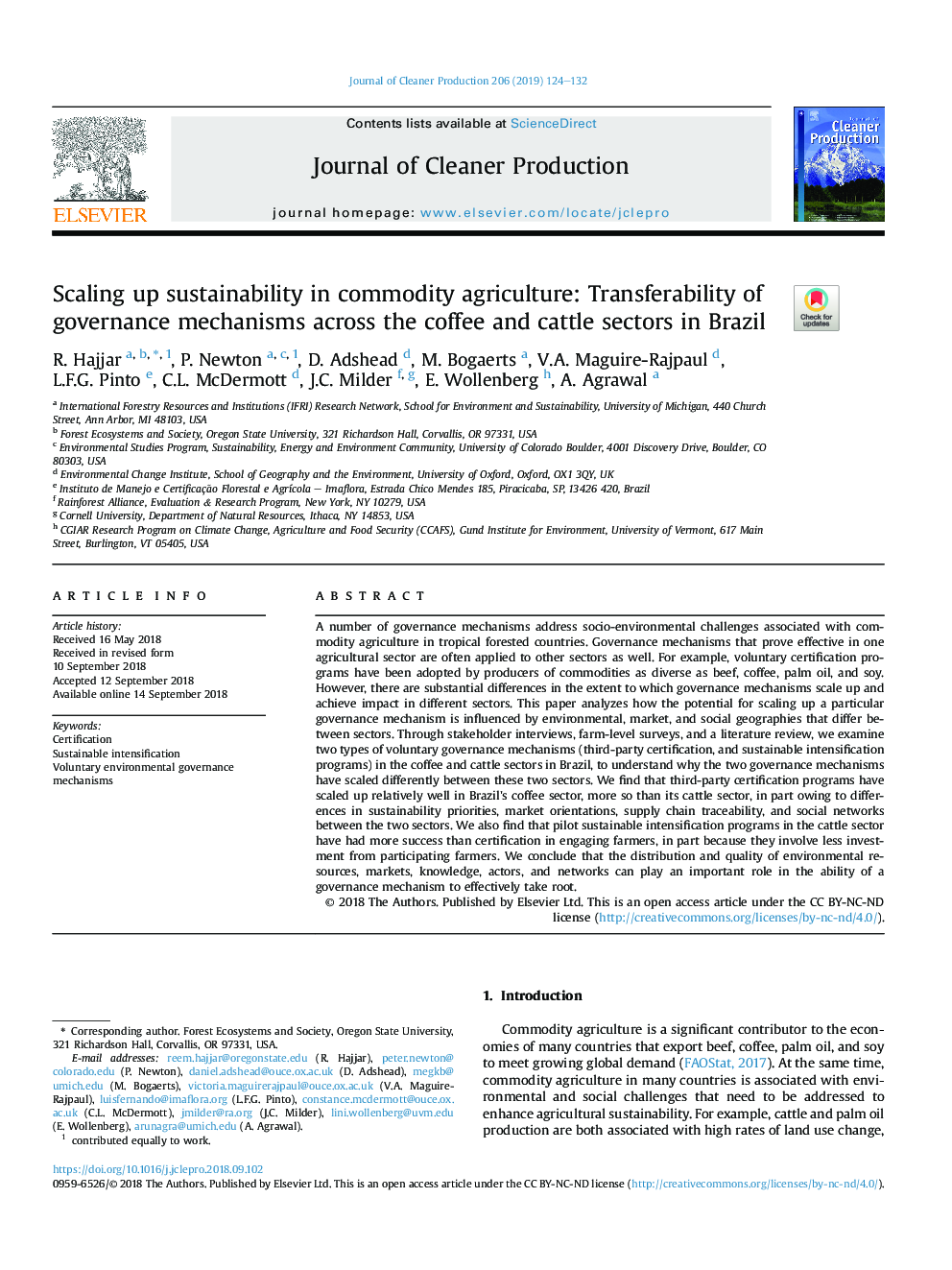| کد مقاله | کد نشریه | سال انتشار | مقاله انگلیسی | نسخه تمام متن |
|---|---|---|---|---|
| 11019722 | 1717621 | 2019 | 9 صفحه PDF | دانلود رایگان |
عنوان انگلیسی مقاله ISI
Scaling up sustainability in commodity agriculture: Transferability of governance mechanisms across the coffee and cattle sectors in Brazil
ترجمه فارسی عنوان
افزایش پایداری در کشاورزی کالایی: انتقال مؤسسات اداری در بخش های قهوه و گاو در برزیل
دانلود مقاله + سفارش ترجمه
دانلود مقاله ISI انگلیسی
رایگان برای ایرانیان
کلمات کلیدی
صدور گواهینامه، تشدید پایدار، داوطلبانه مکانیسم های مدیریت محیط زیست،
ترجمه چکیده
تعدادی از مکانیسم های حکومتی به چالش های اجتماعی و محیطی مربوط به کشاورزی کالایی در کشورهای ممتاز گرمسیری می پردازند. مکانیسم های حکومتی که در یک بخش کشاورزی اثرگذار هستند، اغلب به بخش های دیگر نیز اعمال می شود. به عنوان مثال، برنامه های صدور گواهینامه داوطلبانه توسط تولید کنندگان کالاهای مختلف مانند گوشت گاو، قهوه، روغن نخل و سویا به تصویب رسید. با این حال، تفاوت های قابل توجهی در میزان مکانیسم های حکمرانی وجود دارد که در بخش های مختلف تاثیر می گذارد. این مقاله به بررسی اینکه چگونه پتانسیل افزایش یک مکانیزم حاکمیت خاص تحت تاثیر جغرافیای زیست محیطی، بازار و اجتماعی است که بین بخش ها متفاوت است. از طریق مصاحبه های سهامداران، نظرسنجی های سطح مزبور و بررسی ادبیات، دو نوع از مکانیسم های اداری داوطلبانه (صدور گواهینامه های ثالث و برنامه های تشدید پایدار) در بخش های قهوه و گاو در برزیل مورد بررسی قرار می گیرند تا بدانند که چرا دو مکانیسم حکومتی بین این دو بخش متفاوت است. ما دریافتیم که برنامه های صدور گواهینامه های شخص ثالث نسبتا خوب در بخش قهوه برزیل، نسبت به بخش گاو خود، به دلیل تفاوت در اولویت های پایداری، جهت گیری بازار، قابلیت ردیابی زنجیره تامین و شبکه های اجتماعی بین دو بخش، افزایش یافته است. ما همچنین دریافتیم که برنامه های تشدید پایدار در بخش گاوها موفقیت بیشتری نسبت به صدور گواهینامه درگیر شدن با کشاورزان داشته اند، زیرا این امر شامل سرمایه گذاری کمتر از کشاورزان مشارکت کننده می شود. ما نتیجه می گیریم که توزیع و کیفیت منابع زیست محیطی، بازار، دانش، بازیگران و شبکه ها می تواند نقش مهمی را در توانایی مکانیسم حاکمیت ایفا کند.
موضوعات مرتبط
مهندسی و علوم پایه
مهندسی انرژی
انرژی های تجدید پذیر، توسعه پایدار و محیط زیست
چکیده انگلیسی
A number of governance mechanisms address socio-environmental challenges associated with commodity agriculture in tropical forested countries. Governance mechanisms that prove effective in one agricultural sector are often applied to other sectors as well. For example, voluntary certification programs have been adopted by producers of commodities as diverse as beef, coffee, palm oil, and soy. However, there are substantial differences in the extent to which governance mechanisms scale up and achieve impact in different sectors. This paper analyzes how the potential for scaling up a particular governance mechanism is influenced by environmental, market, and social geographies that differ between sectors. Through stakeholder interviews, farm-level surveys, and a literature review, we examine two types of voluntary governance mechanisms (third-party certification, and sustainable intensification programs) in the coffee and cattle sectors in Brazil, to understand why the two governance mechanisms have scaled differently between these two sectors. We find that third-party certification programs have scaled up relatively well in Brazil's coffee sector, more so than its cattle sector, in part owing to differences in sustainability priorities, market orientations, supply chain traceability, and social networks between the two sectors. We also find that pilot sustainable intensification programs in the cattle sector have had more success than certification in engaging farmers, in part because they involve less investment from participating farmers. We conclude that the distribution and quality of environmental resources, markets, knowledge, actors, and networks can play an important role in the ability of a governance mechanism to effectively take root.
ناشر
Database: Elsevier - ScienceDirect (ساینس دایرکت)
Journal: Journal of Cleaner Production - Volume 206, 1 January 2019, Pages 124-132
Journal: Journal of Cleaner Production - Volume 206, 1 January 2019, Pages 124-132
نویسندگان
R. Hajjar, P. Newton, D. Adshead, M. Bogaerts, V.A. Maguire-Rajpaul, L.F.G. Pinto, C.L. McDermott, J.C. Milder, E. Wollenberg, A. Agrawal,
